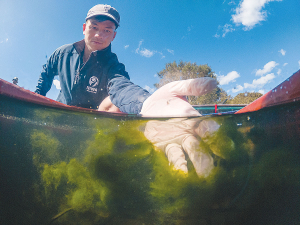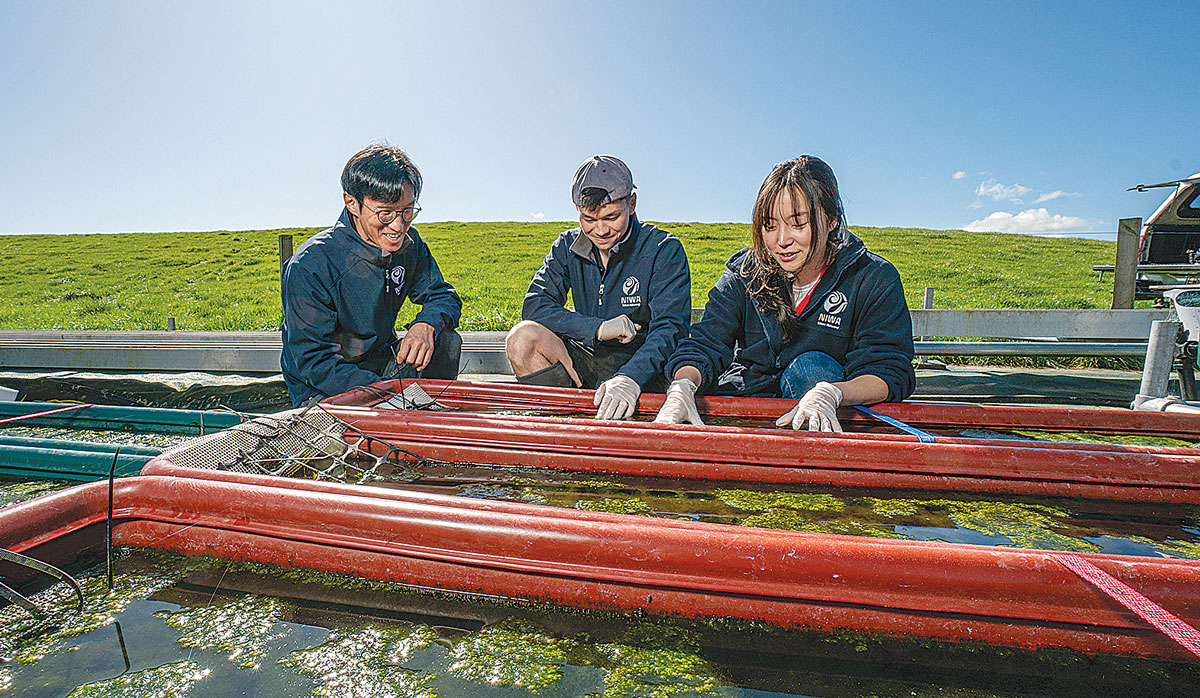Major shakeup for the NZ science system
The government has announced a major restructuring of the country's seven crown research institutes (CRIs), which will see them merged into three public research organisations (PROs).
 NIWA water quality technician Curtis Picken at the Piakoiti Stream where a trial is underway growing algae to remove agricultural runoff. Photo Credit: Stuart Mackay, NIWA
NIWA water quality technician Curtis Picken at the Piakoiti Stream where a trial is underway growing algae to remove agricultural runoff. Photo Credit: Stuart Mackay, NIWA
NIWA is working with Māori farming enterprises on a novel approach to remove nutrients from agricultural runoff.
Flamentous Algae Nutrient Scrubbers, or FANS, is a water management system used to treat agricultural drainage, animal effluent and human wastewater.
The system is already in use in the US and NIWA's Aquatic Pollution Mitigation Group in Hamilton is leading an MBIE Endeavour Fund research project to develop a FANS system for use in a rural context in New Zealand.
NIWA water quality scientist Dr Jason Park says on-farm trials of the FANS systems are underway in partnership with Tainui Group Holdings and the Paeahu Trust in the Waikato.
Park says some pollution mitigation technology was constrained by episodic high drainage flows and nutrient load which overwhelmed treatment capacity.
"Our aim is to co-develop FANS with Māori, industry and government partners as a useful options to reduce agricultural losses and associated degradation of freshwater and estuaries."
He says FANS could help meet the new environmental standards while protecting mahinga kai in accordance with Māori principles of kaitiakitanga. The partnership with Māori and incorporation of Māori knowledge is central to the research project.
"With our iwi partners we will explore the potential of Mātauranga Māori to guide more holistic management of agricultural drainage and enhancement of downstream mahinga kai," says Park.
Mātauranga will be linked with international scientific advances to co-develop innovative approaches.
The project is being guided by a Māori Advisory Panel with involvement of NIWA's Te Kūwaha, its Māori Environment Research team.
FANS systems use gently sloping floways, or channels, to convey drainage water through dense stands of attached filamentous algae.
The floways have three different water depths to determine the best depth for algal growth. They are seeded with native algae from streams near the trial sites, including Oedogonium, Spirogyra, Rhyzoclonium and Cladophora.
As the drainage water flows down the channel, the algae remove dissolved nitrogen and phosphorus from the water and convert them into algal biomass. As the algae grow a portion of the biomass must be harvested periodically.
The biomass could be used for natural fertiliser and animal fodder; these and other uses are being explored by the research team and iwi partners.
Water samples are taken at the inflow and outflow points of the floways every week to assess the nutrient concentrations before and after treatment.
An outdoor FANS trial was set up at the NIWA Ruakura Algal Research Facility in Hamilton in 2021 and then field scale trials next to streams on two Waikato dairy farms commenced in 2022.
One is a property owned by the Paeahu Trust near Morrinsville.
It has two dairy units: Farm No.1 is 73ha and Farm No.2, where the trial is based, is 21ha. The herd is 420 cows, managed by a contract milker.
Trust chairwoman Endine Dixon-Harris says the trust's kaitiaki role is paramount when it comes to environmental responsibility for the whenua and its tributaries.
The Piakoiti Stream runs through Farm No. 2 and in the past the trust has discussed riparian planting and wetland options for the stream.
NIWA appproached the trust about the FANS systems and after a site visit and presentation to explain more, the trust agreed to support the project.
"The project aligns with our kaitiakitanga and matauranga Māori values towards restoring the Mauri of our ancestral waterway," Dixon-Harris says.
"The trust looks forward to positive updates from NIWA in the near future."
Tainui Group Holdings, on behalf of Waikato-Tainui, owns more than 4,000ha of Waikato land supporting dairy, sheep, beef and forestry operations.
A small stream flows through its 200-hectare, 620-cow Tainui Road Dairy where NIWA has established a FANS trial site.
Taiao Manager, Taroi Rawiri, says sustainability of waterways and taonga species depended on new ideas to help reduce the negative impacts of nutrient runoff.
"As kaitiaki of these whenua, it is vital we demonstrate leadership in improving farming operations to promote positive steps towards restoring the health and wellbeing of our waterways.
"The vision of our iwi is that we may one day see again the pristine environmental state that was observed by second Māori King, Kingi Tawhiao, as he composed his lament for Waikato River and his homelands, noting their significance as a treasure for all generations."
Tainui Road Dairy Farm manager Greg Boswell says the stream is crucial to the farm because it is the only waterway that runs all year.
"We know watercress grows in the stream and we have seen freshwater crayfish in it too. There's even an eel that comes out to say gidday near the NIWA trial site, so it is worth the extra attention it's getting from the research."
Data Collection
Jason Park says monitoring from March to July 2022, showed the FANS trial had produced 16.4 tonnes of algal biomass.
It had removed 370kg of nitrogen and 75kg of phosphorus from the waterway per hectare, per year through subsequent algal biomass harvest.
“We expect the biomass production and nutrient removal will more than double in the upcoming summer.”
Data collected from the field trials will help researchers and the Māori land managers determine the level of nutrients FANS systems can remove.
 |
|---|
|
Project manager Jason Park with water quality technician Curtis Picken and research assistant Yeri Shim at the trial site at Paeahu Farm near Morrinsville. Photo Credit: Stuart Mackay, NIWA |
It can then be compared with other nutrient pollution mitigation systems such as wetlands, woodchip bioreactors and riparian management.
“We know already a FANS system can be established in a few weeks and be operational soon after, much more cost effective than a constructed wetland, for example,” Park says.
“But it requires more maintenance than a wetland, to regularly harvest the algal biomass. We are investigating whether a full-scale model could be harvested every month, quarter, or even just once a year.”
The five-year FANS research project is now into its third year and data to date suggests that FANS could be used across a range of land types and nutrient loads.
Park says larger trial sites will be established and tested during the 2022-23 financial year.
Voting has started for the renewal of DairyNZ's milksolids levy.
The most successful catchment groups in NZ are those that have 'a source to sea' approach.
Associate Agriculture Minister and Manawatu dairy farmer Andrew Hoggard says the free trade agreement (FTA) negotiated with India is not a bad deal and his party, Act, will support it when it goes before Parliament.
Newly released data from Environment Canterbury (ECan) Farm Environment Plan (FEP) audits are showing a dramatic lift in environmental performance across the region.
A solid recovery of global dairy prices this year makes a $9.50/kgMS milk price almost a shoo-in for this season.
As New Zealand marks the United Nations’ International Year of the Woman Farmer 2026 (IYWF 2026), industry leaders are challenging the misconception that women only support farming.
OPINION: Fonterra may be on the verge of selling its consumer business in New Zealand, but the co-operative is not…
OPINION: What does the birth rate in China have to do with stock trading? Just ask a2 Milk Company.